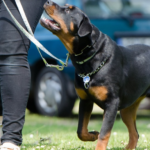Raising a Rottweiler puppy can be a challenging task, especially for first-time owners. Proper training and socialization are crucial for the development of a well-behaved and obedient Rottweiler. This guide will provide a comprehensive overview of how to train your 6-week old Rottweiler puppy.
Raising a Rottweiler puppy requires patience, consistency, and dedication. By following the training tips outlined in this guide, you can raise a well-behaved and obedient Rottweiler puppy. Remember to always use positive reinforcement techniques and to be patient with your puppy as they learn and grow. With proper training and socialization, your Rottweiler puppy will become a loving and loyal companion
Basic Commands
The first step in training your Rottweiler puppy is to teach them basic commands such as sit, stay, come, and heel. These commands will not only help you establish your position as the pack leader but also make it easier to control your puppy’s behavior. Start by using positive reinforcement techniques such as treats and praise to encourage your puppy to obey these commands. Keep in mind that puppies have short attention spans, so keep training sessions short and consistent.
Potty Training
Potty training is an essential aspect of raising a Rottweiler puppy. Start by creating a designated potty area for your puppy and take them to this area frequently. As soon as your puppy goes potty in the designated area, praise and reward them. Accidents will happen, but it’s important to stay patient and consistent with your training. Consistency is the key to success when it comes to potty training a Rottweiler puppy.
Socialization
Socialization is an important aspect of raising a well-behaved Rottweiler puppy. Start by exposing your puppy to different people, animals, and environments. This will help your puppy learn to cope with new experiences and develop a well-rounded personality. Take your puppy to different public places, such as parks and pet stores, and introduce them to new people and animals. The more experiences your puppy has, the more confident and well-adjusted they will become.
Leash Training
Leash training is an important aspect of raising a Rottweiler puppy. Start by teaching your puppy to walk on a leash without pulling. Use positive reinforcement techniques such as treats and praise to encourage your puppy to walk calmly on a leash. Gradually increase the distance and duration of your walks as your puppy becomes more accustomed to walking on a leash.
Behavioral Training
Rottweiler puppies can be strong-willed and may try to assert dominance. It’s important to establish yourself as the pack leader early on by setting boundaries and rules. Use positive reinforcement techniques to encourage good behavior and discourage bad behavior. Consistency is key when it comes to behavioral training, so make sure to consistently reward good behavior and discourage bad behavior.
How to train rottweiler to be friendly
Training a Rottweiler to be friendly requires patience, consistency, and positive reinforcement techniques. Here are some tips to help you train your Rottweiler to be more friendly:
- Socialization: Socializing your Rottweiler from a young age is essential for developing a well-adjusted and friendly dog. Expose your Rottweiler to different people, animals, and environments to help them learn to cope with new experiences.
- Positive Reinforcement: Use positive reinforcement techniques such as treats, praise, and petting to encourage friendly behavior. Reward your Rottweiler for interacting with people and other animals in a friendly manner.
- Basic Commands: Teaching basic commands such as sit, stay, come, and heel can help establish you as the pack leader and make it easier to control your Rottweiler’s behavior.
- Desensitization: If your Rottweiler is fearful or aggressive towards certain people or animals, it’s important to use desensitization techniques to help them overcome these fears. Slowly introduce your Rottweiler to the things that they are afraid of and reward them for calm behavior.
- Consistency: Consistency is key when it comes to training a Rottweiler. Make sure to consistently use positive reinforcement techniques and to enforce rules and boundaries.
- Professional Training: If your Rottweiler has severe behavioral issues, it may be helpful to seek the help of a professional dog trainer or behaviorist.
It is important to keep in mind that Rottweilers are a protective breed and some of them may have a natural tendency to be more reserved or even suspicious of strangers. It is important to be aware of your dog’s personality and work with them accordingly.
How do you control a Rottweiler puppy?
Controlling a Rottweiler puppy requires a combination of training, structure, and consistency. Here are some tips to help you control your Rottweiler puppy:
- Establish yourself as the pack leader: Rottweilers respond well to a strong and confident leader. Use positive reinforcement techniques to teach your puppy basic commands and establish yourself as the pack leader.
- Implement structure and routine: Rottweilers thrive on structure and routine. Establish a consistent schedule for feeding, potty breaks, and training sessions to help your puppy understand what is expected of them.
- Provide plenty of exercise: Rottweilers are a high-energy breed and require plenty of exercise to burn off excess energy. Regular walks and playtime will help keep your puppy physically and mentally stimulated.
- Use positive reinforcement: Use positive reinforcement techniques such as treats, praise, and petting to encourage good behavior and discourage bad behavior.
- Be consistent with rules and boundaries: It’s important to establish clear rules and boundaries for your puppy and to consistently enforce them.
- Seek professional help: If your puppy has severe behavioral issues, seek the help of a professional dog trainer or behaviorist.
- Train them on basic obedience, commands, and manners.
It’s important to remember that Rottweiler puppies are still learning and developing, so it’s important to be patient and consistent with your training. With proper training and socialization, your Rottweiler puppy will become a well-behaved and obedient companion.
Conclusion
In conclusion, controlling a Rottweiler puppy requires patience, consistency, and positive reinforcement techniques. Establishing yourself as the pack leader, providing structure and routine, and providing plenty of exercise are essential for controlling a Rottweiler puppy. Additionally, using positive reinforcement and enforcing clear rules and boundaries can help control behavior. If your puppy has severe behavioral issues, seeking professional help may be necessary. Consistency and patience is key, with the right training, socialization and an appropriate amount of exercise and discipline your Rottweiler puppy will grow into a well-behaved and obedient companion.







